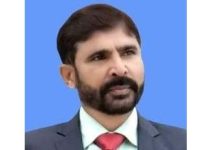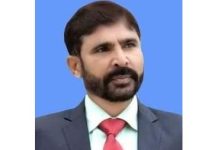Tajik people voted for stability and prosperity
According to the statement by the Central Commission for Elections and Referenda of the Republic of Tajikistan Shermuhammad Shohiyen, during a briefing, the ruling People’s Democratic Party (PDPT) has won a majority of votes of 65.2%, the Agrarian Party 11.8%, the Party of Economic Reforms (PERT) 7.6%, and Socialist Party 5.2 percent. Thus, according to party lists, 16 representatives of PDPT, 3 from Agrarian Party, 2 from the PERT and 1 from the Socialist Party shall have representation in the parliament. The list of the Party of Islamic Revival of Tajikistan supported by a single nation-wide constituency of 1.5% of the voters, the Communist Party is 2.3%, the Democratic Party is 1.7%, Social Democratic Party of Tajikistan – 0,5%.
According to Shermuhammad Shohiyen, over 4 million voters were registered, of whom 3,79 1, 827 voted which is 87.7% voters of the country. In the lower house of Parliament 63 members were elected, 41 from single-mandate electoral districts and 22 on political party lists in a single nationwide constituency.
For the parliamentary mandate 285 candidates contested (103 according to party lists and 182 in single-mandate constituencies), including about 80 of independents. Among these the candidates – 30 women were also included. All eight registered political parties took an active part in the elections including the ruling People’s Democratic (PDPT), the Communist Party, the Islamic Revival Party (IRPT), Social Democratic Party (SDPT), Agrarian Party, Socialist Party, Democratic Party and the Party of Economic Reforms.
The parliamentary election in Tajikistan, which is one of the stable and dynamically developing country in Central Asia, has demonstrated powerful support of citizens to the visionary leadership of President Emomali Rahmon, who has been pursuing people friendly policies of economic development and political reforms since all the years of independence. Owing to these political reforms and economic development, Tajikistan has emerged as a leading country in post-Soviet era and a sound basis for democratic development has been set in place.
The President of the Republic of Tajikistan, Emomali Rahmon in his speech in ceremony of 20 anniversary of adoption of the Constitution of the Republic of Tajikistan on November 06, 2014 stated that “in 2015 in compliance with the Constitution and laws of the country there will be an election to Parliament, local representative bodies and bodies of self-government of towns and villages. As I have repeatedly noted, we are always proponents of these elections, which were held democratically and transparently.”
Parliamentary elections – a new page in history
Parliamentary elections in Tajikistan became an important milestone in history of Tajikistan with implications for the future and the whole Central Asian’s region.
Thus 3209 polling stations were established in the republic and in addition, upon the recommendation of the Ministry of Foreign Affairs 35 polling stations in 27 foreign countries were established.
In general, by political parties under a single republican electoral constituency 123 candidates were nominated, including 30 women.
The election was observed by more than 528 international observers from the OSCE/ODIHR, the CIS, the European Parliament, SCO, Parliamentary Assembly of the Council of Europe (PACE), the IPA CIS Council, the European Union, as well as employees of foreign embassies located in Tajikistan, more 7500 observers from political parties and public associations and 1500 reporters from international and local mass medias.
Invitation for many observers in the parliamentary election reflects the drive of the Republic of Tajikistan to openness and relevance to international standards. This parliamentary election in Tajikistan has been very open, with a range of novelties like TV debates of the candidates that considerably approximated them to international standards.
While according to many observers’ statements the present election showed a significant progress in comparison to the previous elections and approximated Tajikistan to international standards, there are some international organizations who have stated that much is yet to be done in this respect.
The Head of the Office for Democratic Institutions and Human Rights Commonwealth of Independent States (CIS) Executive Committee Sergey Lebedev, who led a group of CIS independent observers in the election said “the observer mission for the March parliamentary elections in Tajikistan from Commonwealth of Independent States and CIS Inter Parliamentary Assembly considered the elections as democratic and free, and passed under the laws of the country.” He also underlined the large number of positive changes that brought the election legislation of the Republic of Tajikistan to the international standards.
Following an invitation of the Government of the Republic of Tajikistan and based on the findings and conclusions of the OSCE/ODIHR Needs Assessment Mission, the OSCE/ODIHR had deployed an Election Observation Mission to the 1 March 2015 parliamentary elections.
The OSCE/ODIHR Election Observation Mission, headed by Miklós Haraszti, consisted of 14 international experts based in Dushanbe. In addition, 16 long-term observers were deployed throughout the country from 24 January 2015.
The OSCE/ODIHR Election Observation Mission had observed that the elections were in compliance with OSCE commitments, other international obligations and standards for democratic elections and within the national legislation. Observers had closely monitored the candidate and voter registration, campaign activities, the work of the election administration and relevant governmental bodies, election-related legislation and its implementation, the media environment and the resolution of election-related disputes. As part of the observation, the mission had also monitored the media coverage of the campaign.
The Head of Office for Democratic Institutions and Human Rights and the OSCE mission Miklos Haraszti noted he was pleased that the voting took place in a calm and peaceful manner. He also mentioned that amendments to the election law in 2014 addressed some long-standing recommendations by the OSCE/ODIHR, but he also stated that further reforms are needed to bring the law in line with the OSCE commitments and other international obligations and standards. Analysts mark importance of taking into account continuation of the democratic dialogue.
Pakistani analytical circles and mass media stated about the positive impact of these elections. Prominent journalist and analyst of Pakistan, the Editor of the Diplomatic News Agency (DNA) and Centreline journal Ansar Mahmood Bhatti stated: “The Government of the Republic of Tajikistan had made elaborate arrangements to hold parliamentary elections in a free and fair manner. The Government had made all out efforts to ensure conductive environment to enable more and more people to come out and cast their votes”.
Pakistan’s leading English newspaper” The News” wrote, that the Tajik Embassy made befitting arrangements to facilitate the Tajik nationals living in Pakistan, to cast their votes in the elections.
People of Tajikistan voted for pragmatic foreign policy of the President of Tajikistan. The President of the Republic of Tajikistan Emomali Rahmon, who also is the Leader of People’s Democratic Party in his speech from March 15, 2015 stated that: “The main purpose of the foreign policy of the Republic of Tajikistan in the long-term outlook, as it has been noted, in order to protect the best interests of the country, should consist of the efforts to create a favorable external environment for the sustainable multidimensional development of the country, the further growth of Tajikistan as a sovereign independent state, to reach agreement and find points of mutual interest with foreign countries and international organizations in the process of solving problems, defined priorities of the foreign policy of our country”.
Regarding the Tajik-Pakistan relations, President of the Republic of Tajikistan Emomali Rahmon also underlined that “Trade and economic opportunities of Pakistan, its geo-strategic position and influence in South Asia and in the Islamic world are of great importance for Tajikistan. Therefore, we will continue to focus our efforts on strengthening relations with Pakistan and in our joint struggle against modern threats, especially terrorism, extremism and drug trafficking, we will purposefully boost our cooperation.”
This cooperation is of particular importance in the framework of trilateral relations with Afghanistan, because it is aimed not only at addressing the problems of Afghanistan, but also demonstrates the new creative sample of relationships in the region. In the framework of this cooperation the early implementation of projects such as CASA-1000 power transmission line project will, in fact, further strengthen the foundation of our relations.
He also stated that “Construction of new railways, roads, gas and oil pipelines, power transmission lines are the core of creative plans, aimed at providing a peaceful and comfortable life for people of Tajikistan, Afghanistan, Iran and other countries of the region. The agenda of our bilateral, trilateral and quadrilateral summit meetings with Iran, Afghanistan and Pakistan which took place more than once, consist namely of these issues. In the future we will further make efforts to develop and strengthen bilateral and multilateral relations with these friendly countries, too.”
The election result was recognized as a definite landslide victory, opening a new era of openness in the political life of the Republic of Tajikistan. It gave the President an exclusive mandate for fulfillment of his agenda of fighting corruption, strengthening the role of Parliament and to pursue a new policy for the betterment of the people of Tajikistan.
Independent Tajik experts stated that the Party of Islamic Revival of Tajikistan and Communist Party have lost their electorate. The election results reflected the aspirations of the people, and how they want to see the future of their homeland, said in an interview to “Avesta” by the Deputy Director of the Center for Strategic Studies under the President of RT, Saifulla Safarov. “The main feature of these elections, in contrast to the past was the fact that the IRPT and the CPT received less votes, and this means that their voices “took” other party” said Safarov.
According to him the ideas and slogans of the Agrarian and Socialist Party are closer to the people. “The Agrarian Party is the party of farmers, and the Socialist Party stands for social justice and education, and they are more close to people.”
Head of the Center for Investigative Journalism of Tajikistan Hurshedi Atovullo noted that the Agrarian Party managed to reach the people through the press. “The Agrarian Party is the largest stratum of the people, i.e. the farmers. It is not surprising that the Communist Party is no more in the game. The Communists had already not been playing “seriously” in the post-Soviet era. Mainly for the party vote people who are older than 65 years, and the party loses the electorate every year” said the journalist.
Regarding the dismal fate of Party for Islamic Revival of Tajikistan, Hurshedi Atovullo was of the view that this happened owing to their mistakes. “The party always talks about 30-35 percent of votes in its support. The last few years saw great pressures on the party, but at the same time, the party leadership advocated tolerance. PIRT identifies and revolves around one person, its leader- Kabiri, but adheres to the philosophy of tolerance” said the source.
The results of the new elections promise a certain change in the Tajik political life. The stagnant situation has moved forward, it’s good for all of us. So says political expert, Director of the analytical center “Content” Zafar Abdullayev.
According to the expert, the new situation that has emerged after the elections has one great plus: the obscure period of congestion has gone and is followed by a period of certainty that allows everyone to make their free choice – as he wants and what should be done next?











